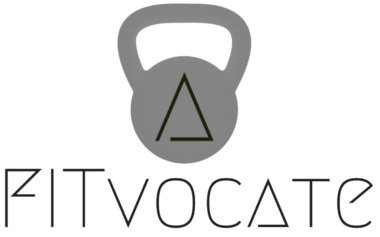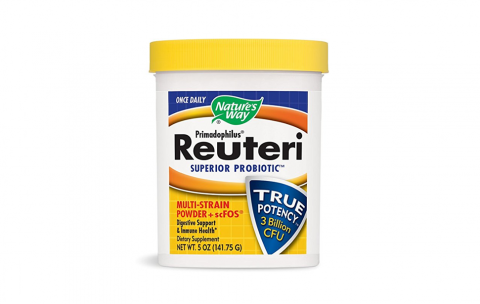
It’s sad to admit, but there are numerous amounts of ways to EASILY lower your testosterone these days:
- Poor diet (over and under eating)
- Eating the wrong types of foods (soy, low quality fats, sugars)
- Sedentary lifestyle
- Excessively working out in the gym
- Poor sleeping habits
- Stress
- Excessive alcohol
- Not enough sunlight
- Under-active thyroid
However, the way to fix a declining concentration of the male sex hormone in your blood is as simple as doing the opposite of what is listed above.
Yes, doing the opposite of what is stated above will require (for most individuals) a total lifestyle change.
There is a way to get your body back on track without doing a drastic lifestyle change: Probiotics.
Probiotics (the internationally endorsed definition of probiotics is)“ live microorganisms, which when administered in adequate amounts confer a health benefit on the host.”[1]
This study shows how “Probiotic Microbes Sustain Youthful Serum Testosterone Levels and Testicular Size in Aging Mice.” [2]
A healthy individual should literally have pounds of healthy bacteria within their gut – this is why some people label the GI (gastrointestinal) system as your “second brain”.
With that all being said, here are my:
Top Five Probiotic Sources
Note: You can find all recommendations at the bottom of the article.
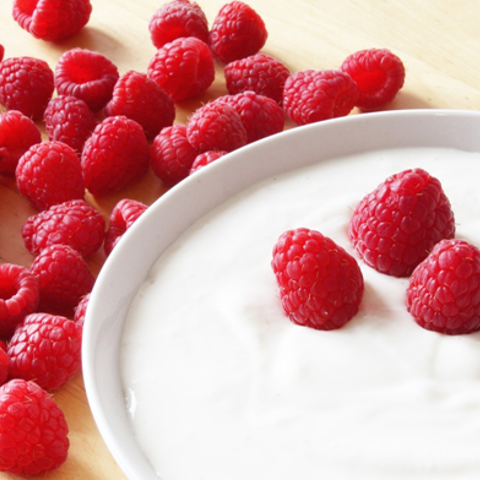
#1 Greek Yogurt
I’ve said it before and I’ll say it again: Greek yogurt is possibly the best food source for getting probiotics. It is readily available and can easily become a staple in your daily life. Greek yogurt is well known as a high protein source, but really, it’s a great protein source with the added benefit of being loaded with probiotics.
However, just because it’s labeled as Greek yogurt, that doesn’t mean it is automatically loaded with probiotics. Simply check the label for “Contains Active Cultures.”(Nearly all brands offered at the supermarket have this on their label.)
Ingesting Greek yogurt as a Probiotic source has the added benefit of aiding in lactose intolerance:
“The inability to digest lactose adequately by certain people is due to the absence of b-d-galactosidase in the human intestine and this leads to various degrees of abdominal discomfort (Kim &Gilliland, 1983). Some lactic acid bacteria used as starter cultures in milk and fermentation, and probiotic bacteria such as L. acidophilus and B. bifidum produce b-d-galactosidase. This enzyme hydrolyses lactose, which results in increased tolerance for dairy products (Kim &Gilliland, 1983).” [3]
Conclusion:
If you’re not new to this site, then you already know how I stress the importance of eating Greek yogurt on a daily basis. Eating a couple servings of Greek yogurt a day is a great way to boost the concentration of probiotics in your gut.
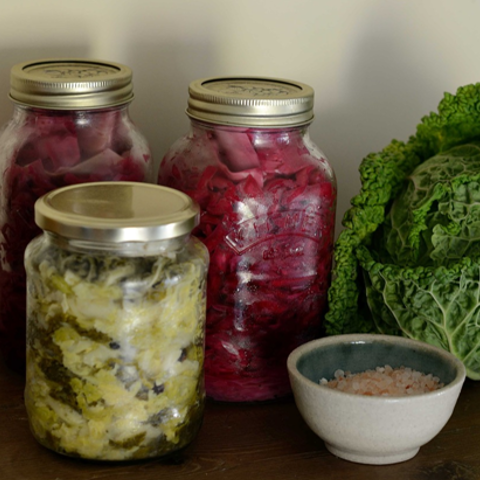
#2 Sauerkraut and Kimchi – Fermented Vegetables
The key word here is “Fermentation”. Fermentation is: “the chemical breakdown of a substance by bacteria, yeasts, or other microorganisms, typically involving effervescence and the giving off of heat.”[4]
Just like in Greek yogurt (which is the fermentation of milk via the addition of active cultures), Sauerkraut and Kimchi involve the fermentation of cabbage via the use of active cultures (the fermentation process may be applied to any vegetable, but typically Napa cabbage is used).
The benefit of eating fermented vegetables is that the live active cultures used during fermentation, remain within them when packaged. When you open a container of sauerkraut, you’re opening a culinary Petri dish filled with edible goodness.
Fermented vegetables are, in fact, easy to make for yourself: it just requires a little bit of time. For example, here’s how you make sauerkraut:
- Chop the cabbage
- Mix with salt (avoid table salt. Use a high quality salt: sea salt, pink Himalayan salt, etc.)
- Pour into a non-reactive jar (preferably glass)
- Pour any liquid that came out of the cabbage, over the cabbage in the jar
- Compress and allow to sit for at least 3 days
Boom, you’ve made a homemade Probiotic. Here are some additional benefits:
- Cabbage is considered a cruciferous vegetable, which has been proven to lower estrogen in the body [5]
- The minerals found in a high quality salt have thyroid boosting qualities
Conclusion:
Fermented vegetables are great for upping your Probiotic intake, but some tend to be a tad high on the sodium content. Sodium content generally isn’t an issue for most people (unless you’re an individual with a heart condition) especially if you’re an avid gym goer and you sweat a lot while working out.
So load up on some of that anti-estrogenic sauerkraut!
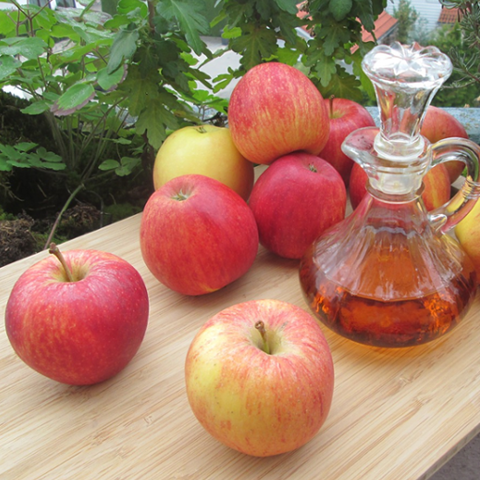
#3 Apple Cider Vinegar – with the “Mother”
Unlike Greek yogurt and sauerkraut, apple cider vinegar is not all that tasty. Most people stop taking it because they simply cannot handle how harsh it is. But, if you’ve learned anything, the more potent a health food is, the less appetizing it is – true story.
Luckily, with apple cider vinegar, you don’t need to take any more than a shot-glass size dose every day.
What’s in apple cider vinegar that makes it so beneficial?
Apple cider vinegar contains a rather high concentration of the organic compound Acetic Acid. This is beneficial in reducing your body’s pH and can aid in the reduction of acid reflux disease. Apple cider vinegar also contains high concentrations of polyphenols which are rapidly absorbed by the intestine. Apple cider vinegar has many immune boosting qualities such as:
“antioxidant, antiallergic, anti-inflammatory, anti-viral and anti-microbial, anti-proliferative, anti-mutagenic, anti-carcinogenic, free radical scavenging, and induction of International Journal of Diabetes Research 2016, 5(6): 129-134131 antioxidant enzymes[19, 20]”[6]
Apple cider vinegar has been shown to be rather beneficial to individuals suffering from diabetes as a natural way to regulate blood sugar levels. This study [6] also showed how in rats, after 7 consecutive days of ingesting apple cider vinegar, apple cider vinegar lowered plasma glucose levels significantly in diabetic mice. It can be concluded from this study, that ingesting apple cider vinegar on a regular basis, helps improve insulin sensitivity. Being highly sensitive to insulin will help you absorb nutrients as opposed to being in an insulin “desensitized” environment; an environment that a poor diet of fast acting carbohydrates will provide.
That’s all great, but what does any of this have to do with probiotics?
Everything.
The process of fermentation (as stated above) is when active cultures are allowed to break down a food source, in essence preserving it. Apple cider vinegar is created with a “mother” which is essentially a slimy, Probiotic rich starter, which allows more active cultures to be produced within the vinegar and ultimately produce the product you’re familiar with.
In every bottle of apple cider vinegar, you’re getting a decent amount of Probiotic cultures, which can be seen on the bottom of the bottle. It’s important to note that you can buy apple cider vinegar in two forms: with or without the mother. Without the mother, you’ll get all the benefits associated with acetic acid and polyphenols. With the mother, you’ll get all those benefits plus the added benefits provided by active cultures.
Conclusion:
I used to think apple cider vinegar was all hype – after much research, I have found it to actually be a strong tool in my pro-androgenic arsenal. I purchase a two pack from Bj’s Wholesale Club for about $9.00 and, taking two shots a day, these bottles last about three weeks. Apple cider vinegar is relatively cheap and proven effective! Bottoms up!

#4 Bleu Cheese – Delicious, rotten food with many benefits
Bleu cheese: you either love it or hate it. It’s not that most people don’t like the taste of bleu cheese, they are simply turned off by the idea of it being “rotten.” However, once you get over the idea that you’re eating a food covered in mold, you’ll realize that it has a taste and texture that is rather addicting.
It’s spelled “Bleu” (which is how it’s spelled in the French language) but for the sake of my sanity and not being told over and over again by my word processor that I’m spelling it wrong, it’ll be called: blue cheese.
If you’ve never had a steak, potato or salad with blue cheese crumbled over it, oooweee you’re not living.
With its uniquely delicious flavor and aroma, blue cheese is easily one of the most enjoyable ways to get in your probiotics.
A 100 gram serving of blue cheese will give you:
- ~22 grams of quality protein
- ~30 grams of quality fat
- 50% of your RDA of Vitamin B12
To pick a quality blue cheese: shoot for one that isn’t pasteurized in anyway. Pasteurization involves a process of exposing the food item to intense heat, which kills the good bacteria along with the bad.
Conclusion:
I don’t recommend (but it is pretty darn easy) eating 100 grams of blue cheese in one sitting. 100 grams will give you way too much sodium. Eat a good portion of it, but a balanced, pro-Probiotic diet involves all of the food sources I’ve listed above. If you eat all of these food sources daily, I guarantee you’ll notice a difference in your digestion, food absorption and even confidence!
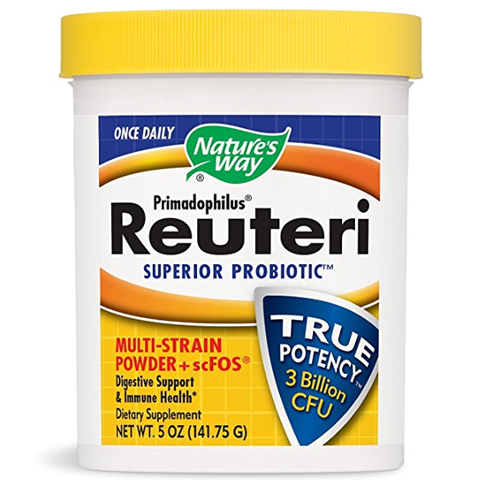
#5 Probiotic Supplementation – if all else fails, pop a pill!
Let’s face it, food sources that are rich in probiotics tend to have one flavor: sour and borderline bitter.
If you simply cannot (no matter how hard you try) stomach the flavor of fermented foods, then, AND ONLY THEN, buy the pill form.
There are numerous brands of probiotics that all contain various strands. They are all beneficial, but after reading this article by MIT [2] regarding rats being fed with a Probiotic by the name of Lactobacillus reuteri, experienced not only larger testes but social dominance – that’s the form I recommend and personally take.
The specific brand I recommend is not in the pill form so you can weigh out as much as you need: which is ~3g. So, once again, if you don’t have a digital scale: GET ONE! (recommendation at end of article)
Conclusion:
If you are experiencing unexplainable bloating, have issues with digesting food (your poop isn’t as sufficient as you’d like) or are coming off of an anti-biotic – these are food items I recommend you include into your daily food intake.
If you can’t stomach the taste or idea of eating bacteria laden foods, then you can simply take the supplementation form I recommended.
Either way, increasing the quality of your gut flora (what the probiotics in your gut will ultimately do) will directly and positively correlate to your testosterone levels. Will it make you stronger? Not directly. What they’ll do is increase your absorption of food and your sense of well being. Better absorption of food and feeling more positive are two great things that will help you recover and attack whatever goals you want to achieve in life.
FOOD IS LIFE!
We are advocates of your goals!
-Chris
[1] - https://goo.gl/3zwXA3
[2] - Poutahidis, Theofilos, Alex Springer, Tatiana Levkovich, Peimin Qi, Bernard J. Varian, Jessica R. Lakritz, Yassin M. Ibrahim, Antonis Chatzigiagkos, Eric J. Alm, and Susan E. Erdman. “Probiotic Microbes Sustain Youthful Serum Testosterone Levels and Testicular Size in Aging Mice.” Edited by Stefan Schlatt. PLoS ONE 9, no. 1 (January 2, 2014): e84877.
[3] - https://goo.gl/Ha1a5h
[4] - https://goo.gl/d19GiW
[5] - https://goo.gl/JP9KkR
[6] - https://goo.gl/v7PaCh
